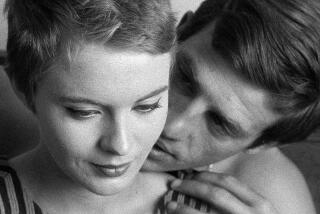‘Portraits’ Begins Truffaut Retrospective
- Share via
Francois Truffaut, who died of cancer 10 years ago at age 52, was a charmer. He had an enduring boyishness and a passionate, encyclopedic knowledge of world cinema to which he contributed substantially, beginning with his internationally acclaimed, semi-autobiographical 1959 “400 Blows.”
Serge Toubiana and Michel Pascal, in their illuminating, engaging “Francois Truffaut: Stolen Portraits” (Saturdays and Sundays at 11 a.m. at the Sunset 5), acknowledge the charm of both the man and his films, but they also provide a glimpse of a darker side in him and his work through the candid remarks of his friends and colleagues, interspersed with appropriate clips from his films.
In their documentary, which launches a retrospective of 10 Truffaut films at the Sunset 5, Toubiana and Pascal aren’t out to denigrate Truffaut but are attempting to see him in the round.
The entire film is suffused with the characteristic French respect for emotions and for precision of expression. Truffaut tended to be a bit hazy about his childhood, which involved a brush with the law. He once wrote that his parents meant no more to him than strangers.
The filmmakers are especially good at digging out his troubled youth, shaped by a remote, seemingly indifferent mother and stepfather (who were stunned, nonetheless, by their far-from-flattering alter egos in “The 400 Blows”). Truffaut, it seemed, came to an understanding of his mother only when it was too late and hired private detectives to try to locate his real father.
Whereas such fellow filmmakers as Alexandre Astruc and Eric Rohmer and various actors speak with affection, gratitude and insight into the complex Truffaut and his films, it’s left to director Bertrand Tavernier to provide the film’s real zinger. Forty years ago, Truffaut, who at age 17 had attempted to start a film club, wrote in Cahiers du Cinema a famous attack on the French traditional “cinema of quality” that paved the way for the Nouvelle Vague.
Tavernier reveals that Truffaut had befriended the veteran screenwriter Pierre Bost (subsequently rejuvenated by Tavernier himself) only to attack him in his article. Truffaut then wrote Bost, saying he secretly admired him but that he was a journalist with a reputation to make. While pointing out that Truffaut should have instead attacked some of the directors who filmed Bost and his partner Jean Aurenche’s scripts, Tavernier remains deeply impressed that Bost always resisted making public Truffaut’s letter to him.
There’s a certain detached sadness in Madeleine Morgenstern, Truffaut’s ex-wife, but she insists that the help from her and her producer-father hastened Truffaut’s success only about a year, insisting that he would have made it without them. Described by his daughter Ewa as a “man using himself up,” Truffaut, a smoker--he loved to pass out cigars--apparently always believed he would die young.
In the film, we miss the presence of Jean-Luc Godard, Jeanne Moreau and especially Jean-Pierre Leaud, Truffaut’s frequent screen alter ego, starting with “The 400 Blows.” But there’s an interview clip of his friend and hero Jean Renoir, who says that upon seeing “Jules and Jim,” he thought, “Gosh, that’s good. I wish I had done that myself.”
The 10 Truffaut films screen at 11 a.m. only: “The 400 Blows” (Saturday, Sunday, Jan. 16); “Shoot the Piano Player” (Jan. 21, 22); “Jules and Jim” (Jan. 28, 29); “The Bride Wore Black” (Feb. 4, 5); “Mississippi Mermaid” (Feb. 11, 12); “The Wild Child” (Feb. 18, 19, 20); “Day for Night” (Feb. 25, 26). “The Story of Adele H” (March 4, 5); “Small Change” (March 11, 12) and “The Last Metro” (March 18, 19). Information: (213) 848-3500.
More to Read
Only good movies
Get the Indie Focus newsletter, Mark Olsen's weekly guide to the world of cinema.
You may occasionally receive promotional content from the Los Angeles Times.








